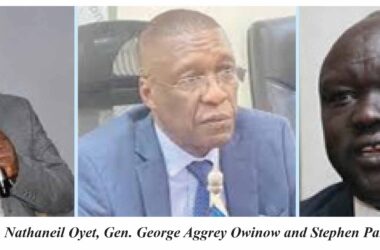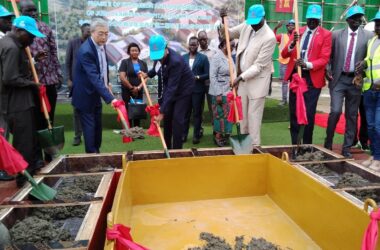By William Madouk
Traders at Konyo-Konyo north market were left in shock upon discovering that the Juba City Council and Islamic Council had struck a secret deal to divide the disputed market area among themselves.
The ongoing dispute between Central Equatoria State government and the South Sudan Islamic Council over the land has been a long-standing, with no resolution in sight.
Upon learning about the alleged secret deal, including the distribution of tokens to some individuals, the outraged traders, gathered at the Juba City Chamber of Commerce office in Konyo-Konyo to express their frustration.
Mr. Stephen Wani Aquilino, the chairperson of the Juba City Chamber, revealed that the matter came to light just two weeks ago when the two institutions allegedly conspired to divide the market without informing the traders.
“The committee has to revise the previous record of Konyo-Konyo market which is at the Ministry of Public Works and Communications, Department of Land and Town Planning- Equatoria region, Juba, to find the real ownership of those shops,” he said his position letter.
He added that a sample of original documents dated back to since 1977, 1982 and 1987 clearly shows that the disputed area does not belong to the Islamic Council.
“It is clear that the land at the Konyo-konyo mosque is given to Islamic Council on the opposite side of the market since the time of the prime ministry, Ibrahim Abut in 1958,” he noted.
“When we go back to the history of Sudan, the land given to Mahad was not for Muslims, it is for Institute in Arabic means Mahad.”
Mr. Aquilino underscored that they need a win-win solution whereby the conflicting parties should not ignore the Juba City Chamber of Commerce – a body that represents traders in their meetings.
Furthermore, he cited that traders on the ground who have original documents for their shops shouldn’t be ignored or victimised.
“We need a consideration to the local traders who have a temporary document from the local government authority,” he added.
“Trades who obtained a document of third class, the committee shouldn’t deny their rights of business land ownership.”
One trader who identified himself as Bashir said they were the first people who established the Konyo-konyo market in the 1970s.
He stressed that Konyo-konyo market belongs to the Juba City Council, not the Islamic Council.
“We our brother in the Islamic Council – I am telling you move away a bit this place doesn’t belong to you,” he said.
“This place was all demarcated at the time of Peter Cirilo, when engineer Amadon in 1996 said the place should distributed to people who were already working in Konyokonyo market at that time.”
Another trader called Yohanna said he had been working in Konyokonyo for nearly 51 years now.
“We sale sugar here since the time of Abel Alier, Joseph Lagu and Peter Cirilo the pioneers of this market and I am very disappointed that the Islamic Council has only place – Islamic Endowment affairs in Juba,” he said.
He protested the proposed idea of the market division between the Juba City Council and the Islamic Council.
It is a dispute that surfaced in 2018 after the country was reverted to 10 states, dissolving the former administrations.
The restructuring came with a bag of curses for the traders as they were subjected to compulsory ground rent fees by the two administrations.
The dispute escalated last year, compelling the state government to pursue a legal criminal case against the former, which was nullified on September 21, 2022, by the Juba County Court.
The court states that whoever feels offended, either the complainant, the local government- or the respondent, the South Sudan Islamic Council – should institute the case in a civil court to determine the rightful owner of the land.
Following the order, the Juba City Council issued a local order banning traders from complying with their opponent until the court decides who owns the land.
The city council further said even if the court rules in favour of the Islamic Council, they would compensate the council with another land beside the disputed area.




